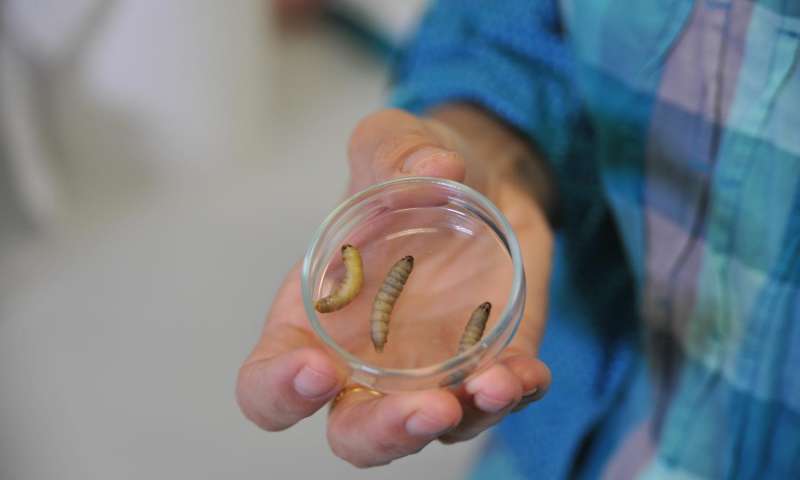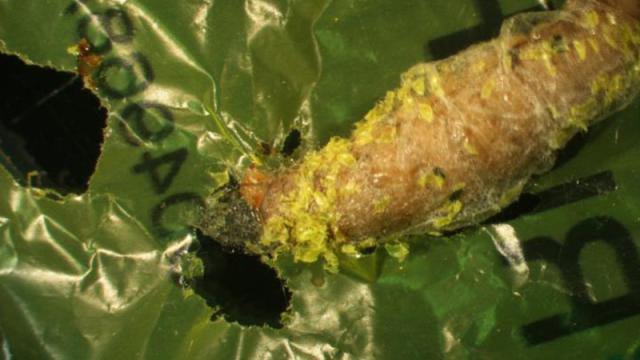In a chance discovery, a research team from Europe has learned that a common insect larva is capable of breaking down the plastic found in shopping bags and other polyethylene-based products. This trash-munching caterpillar could inspire scientists to develop a new chemical process to tackle the growing problem of plastic waste.
A wax worm chewing a hole through plastic. Plastic debris can be seen attached to the caterpillar. (Image: Federica Bertocchini, Paolo Bombelli and Chris Howe)
Beekeepers are all too familiar with the larvae of the moth Galleria Mellonella, also known as the wax moth. This daring insect has the audacity to lay its eggs inside of of bee hives, where they hatch and thrive on beeswax. But as a new study published in Current Biology shows, these caterpillars are not just capable of breaking down beeswax, they can also break down plastic — and that probably isn’t a coincidence. The chemical processes are likely similar, and researchers are now excited by the prospect of developing a biotechnological approach to the plastic waste that chokes oceans, rivers and landfills.
Like so many other scientific discoveries, this one was assisted by a bit of luck. Study co-author Federica Bertocchini of the Spanish National Research Council happens to be an amateur beekeeper. While removing the parasitic pests from the honeycombs in her beehives, she noticed that the plastic bags she used to store the caterpillars became riddled with holes in less than an hour. Like the good scientist that she is, she decided to investigate further, recruiting biochemist Paolo Bombelli from the University of Cambridge to help out.

Image: Federica Bertocchini, Paolo Bombelli, and Chris Howe
In experiments, the researchers exposed 100 caterpillars to a plastic polyethylene bag obtained at a UK supermarket. After just 40 minutes, holes began to appear in the bag, and after 12 hours the larvae had managed to reduce the amount of plastic by as much as 92mg. That’s incredibly fast — even faster than the plastic-munching bacteria reported last year, which were capable of biodegrading plastic at a rate of 0.13mg per day.
In subsequent tests, the researchers ground the caterpillars into a paste, smearing it onto the plastic. The bags degraded in a similar fashion, indicating that chemicals in the caterpillar’s body — likely in the gut — are responsible for the action. Naturally, this has the researchers excited, and they have already filed a patent on their discovery.
“If a single enzyme is responsible for this chemical process, its reproduction on a large scale using biotechnological methods should be achievable,” said Bombelli in a statement. “This discovery could be an important tool for helping to get rid of the polyethylene plastic waste accumulated in landfill sites and oceans.”
Indeed, plastic waste is a growing problem. Around 80 million tonnes of polyethylene is produced each year around the world, and it takes an inordinate amount of time — upwards of a hundred years — for this substance to degrade completely. Researchers are now looking to nature to find ways of boosting the speed at which we can degrade this stuff. In addition to bacteria, scientists have also discovered plastic-eating fungi.
Nature may have stumbled upon an answer to our plastic problem, but we still need to figure out how these creatures do it if we’re to ramp their biological processes up to an industrial scale.
“The caterpillar produces something that breaks the chemical bond, perhaps in its salivary glands or a symbiotic bacteria in its gut,” said Bombelli. “The next steps for us will be to try and identify the molecular processes in this reaction and see if we can isolate the enzyme responsible.”
Obviously, the caterpillars didn’t evolve to eat plastic. It just so happens that their wax-munching skills also work on human garbage. Call it a happy accident.
